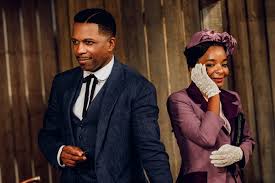Leslie Odom Jr. spent much of his youth soaking up Philadelphia’s arts world.
He studied dance at Philadanco, acting at New Freedom Theatre, both at a performing-arts high school. But overshadowing all of that was the church.
“What the church connected me to was conviction in performance,” Odom, a Tony-winner for “Hamilton” — told the Television Critics Association.
It’s fine to sing the right notes and dance the right moves, but the bigger goal is to project passion. That became a goal “any time … I stood up in front of the congregation to do some reading. Or certainly when I heard the pastor deliver a sermon and stir us.”
Now that fits his starring role in “Purlie Victorious” (shown here) at 9 p.m. Friday (May 24) on PBS.
This is the Tony-nominated revival of a play that’s been mostly ignored for 62 years. Purlie (Odom) has a singular obsession: Get the $500 that a white landowner has been withholding; then buy the nearby barn and turn it into a church.
He approaches tiat with a flurry of words and action, like a grand sermon or a gospeil solo. “The play moves like a musical in every respect,” said director Kenny Leon.
The result reflects the remarkable range of Ossie Davis. As a teen, he walked from rural Georgia to Howard University (in Washington, DC), where he was mocked for his rural look. He became an acclaimed actor, wrote seven books and made key speeches, including the eulogy for his friend, Malcolm X.
When Davis was asked to write a play about Blacks in America, Leon said, “He said, ‘It’s too painful. I can’t write it.’
“And he said, ‘Oh. I’ll write a comedy.’ …. He leaned in with love and joy.”
The result debuted on Broadway in 1961, with young Alan Alda as the landowner’s son. Davis played Purlie, with Ruby Dee (his wife) playing his accomplice, the bewildered Lutiebelle Gussie Mae Jenkins.
The show drew modest attention – 261 performances and one Tony nomination (for Godfrey Cambridge, in support). Davis took it on tour, turned it into a movie (“Gone Are the Days”) and allowed it to be turned into a musical, simply called “Purlie.”
Then “Purlie” was mostly ignored. The recent Broadway production was reportedly the first by a commercial theater in 62 years.
This time it ran for 151 performances. “It was probably the best play I’ve seen on Broadway in quite a while,” said David Horn, PBS’ “Great Performances” producer. Jesse Green of the New York Times seemed to agree, calling it “scathingly funny.”
This time, “Purlie Victorious has six nominations, — including best play revival actor (Odom) and supporting actress (Kara Young, shown here with Odom, in a broadly comic portrayal of Lutiebelle).
Green said the show should win in all three categories – but said it won’t win in any of them. That will be settled on June 16; by then, “Purlie Victorious” – dormant for six decades – will be familiar to PBS viewers.

Odom brings pulpit passion to “Purlie”
Leslie Odom Jr. spent much of his youth soaking up Philadelphia’s arts world.
He studied dance at Philadanco, acting at New Freedom Theatre, both at a performing-arts high school. But overshadowing all of that was the church.
“What the church connected me to was conviction in performance,” Odom, a Tony-winner for “Hamilton” — told the Television Critics Association.
It’s fine to sing the right notes and dance the right moves, but the bigger goal is to project passion. That became a goal “any time … I stood up in front of the congregation to do some reading. Or certainly when I heard the pastor deliver a sermon and stir us.”
Now that fits his starring role in “Purlie Victorious” (shown here) at 9 p.m. Friday (May 24) on PBS. Read more…